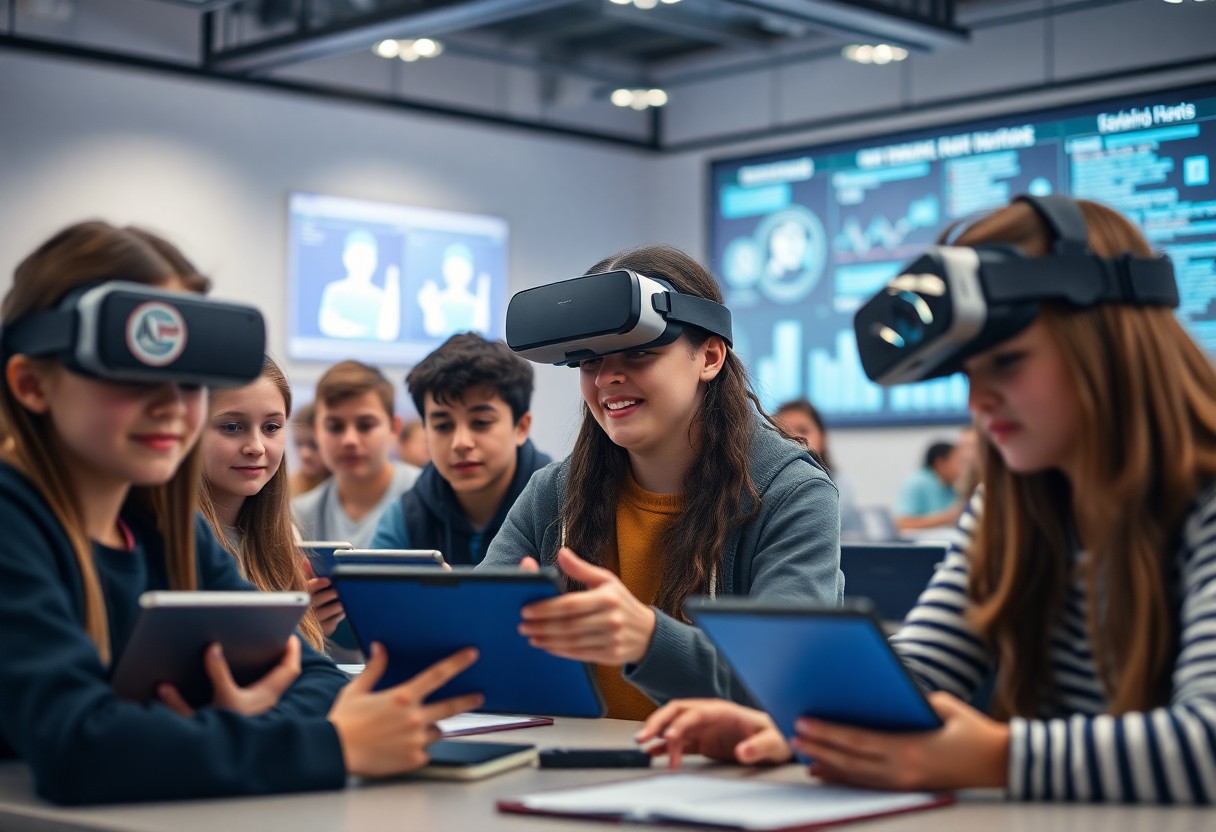Personalized learning is revolutionizing the way you approach education, and the Human Learnome Project is at the forefront of this transformation. By leveraging advanced data analytics and insights into individual learning patterns, this initiative develops tailored educational experiences that align with your unique strengths, preferences, and goals. In this blog post, you will discover how the Human Learnome Project is spearheading efforts toward effective personalized learning solutions, enabling you to engage more meaningfully and achieve your full potential in various learning environments.
Key Takeaways:
- Individualized Insights: The Human Learnome Project provides deep data analysis on how each learner processes information, enabling tailored education strategies.
- Dynamic Adaptation: The project emphasizes real-time adjustments to learning paths based on evolving learner needs and progress.
- Interdisciplinary Approach: By integrating insights from cognitive science, psychology, and technology, the project enhances personalized learning experiences.
- User-Centric Technology: The platform prioritizes user engagement, ensuring tools are intuitive and aligned with learner preferences.
- Scalable Solutions: The methodologies from the project can be applied across diverse educational settings, fostering wide-scale implementation of personalized learning.
Understanding the Learnome Concept
The Learnome concept represents a profound approach to personalized education, encapsulating how individuals learn and process information uniquely. It acknowledges that your learning pathway consists of diverse components, including your cognitive abilities, emotional intelligence, and environmental influences. By embracing this multifaceted perspective, the Learnome Project aims to tailor educational experiences to fit your specific needs and preferences, enhancing the overall learning process.
Definition of Learnome
Beside the traditional educational models, the term ‘Learnome’ refers to the comprehensive compilation of your learning preferences, styles, and experiences. This personalized data set forms the basis for creating effective learning environments tailored just for you. By analyzing your interactions, both inside and outside of formal education settings, the Learnome captures a holistic view of your educational journey and how you engage with material.
Historical Context of Learnome Research
Among the key milestones in the evolution of educational psychology, the Learnome concept arises from the need to understand individual learning processes. Over the decades, researchers have investigated into various theories of intelligence and learning styles, giving rise to the understanding that one size does not fit all in education. This historical backdrop set the stage for the creation of the Learnome, enabling it to synthesize insights from cognitive science and pedagogical practices.
To fully appreciate the Learnome concept, you must recognize the pivotal shifts in education paradigms. The transition from standardized education to more individualized approaches has been marked by various research initiatives. Surveys, case studies, and technological advancements have all contributed significantly to developing a framework that accommodates your unique learning requirements. This progression illustrates the continuous effort to make education more responsive to the nuances of learner diversity.
Significance in Education
Around the world, educational institutions increasingly acknowledge the importance of personalized learning strategies. The Learnome Project plays a critical role in this movement by providing a detailed understanding of how you learn best. Consequently, leveraging this knowledge can help educators design more effective curricula that resonate with you, leading to better retention and application of knowledge.
Consequently, by prioritizing the Learnome in educational practices, institutions can foster an environment where your individual strengths are recognized and nurtured. This emphasis not only benefits you but also paves the way for innovative teaching methods that can accommodate varied learning preferences in a diverse classroom setting. The ripple effect of this personalized approach could revolutionize education, making it more relevant and impactful for every learner.
Framework of the Human Learnome Project
Project Overview
It is necessary to understand how the Human Learnome Project operates as a leading initiative in personalized learning. This groundbreaking project is designed to collect, analyze, and utilize vast amounts of data related to individual learning experiences. By mapping out various learning pathways, the Human Learnome Project aims to create a comprehensive framework that identifies what works best for each unique learner.
For educators, learners, and policymakers, this project represents a significant shift toward data-informed decision-making in education. By leveraging insights derived from diverse learning contexts, the Human Learnome Project facilitates tailored learning solutions that empower individuals to reach their full potential.
Key Objectives and Goals
At the core of the Human Learnome Project are its key objectives and goals, which prioritize enhancing personalized learning experiences for all individuals involved in the education system. One primary goal is to establish a robust data infrastructure that supports the continuous gathering and processing of learning-related data. This data allows for the development of innovative assessment tools that align with individual learner profiles and preferences.
At the same time, the project aims to foster collaboration among educators, researchers, and industry leaders to harmonize best practices. By doing so, it aspires to create a framework that not only advances educational equity but also integrates seamlessly into existing learning environments. Additionally, the Human Learnome Project seeks to empower learners by providing them with insights into their own learning journeys, encouraging self-directed and lifelong learning.
Learnome mapping facilitates the creation of personalized learning paths that are adaptable to various educational contexts and challenges. By employing advanced analytics and research methodologies, the project envisions a new era in education where data is employed to meet the diverse needs of learners, helping them thrive academically and personally.
Key Stakeholders and Contributors
Below the surface of the Human Learnome Project lies a network of key stakeholders and contributors dedicated to driving this initiative forward. These stakeholders include educators from various academic institutions, data scientists, policymakers, and technology experts, all of whom play vital roles in shaping the project’s direction and outcomes. By fostering collaboration across these diverse groups, the project strives to ensure that the insights gained are actionable and beneficial to all involved.
Furthermore, the Human Learnome Project engages with learners themselves, valuing their input and experiences as foundational to its goals. By incorporating feedback from a broad range of participants, the project can enhance its understanding of different learning contexts, ultimately leading to more effective and personalized educational solutions.
And, as a participant or collaborator of the Human Learnome Project, you contribute to an ecosystem that prioritizes transparency, inclusivity, and innovation. The commitment from all stakeholders creates an environment where personalized learning can evolve in meaningful ways, giving everyone the opportunity to succeed.
Data Collection and Analysis Techniques
Keep in mind that effective data collection and analysis techniques are integral to the Human Learnome Project’s capacity to foster personalized learning solutions. You’ll find that the methods implemented in this project not only gather diverse types of data but also refine learning experiences based on individual learners’ needs. This approach warrants a keen examination of the methodologies employed during the data collection phase.
Methods of Data Collection
Against the backdrop of an ever-evolving educational landscape, the Human Learnome Project utilizes various methods to collect data. Surveys and questionnaires help gather self-reported information from learners about their experiences, preferences, and challenges. Also, observational studies create opportunities to assess real-time engagement and learning behaviors in educational settings. By combining both qualitative and quantitative methods, you can derive richer insights into the diverse learning journeys of individuals.
Quantitative vs. Qualitative Analysis
Any effective analysis will typically involve a systematic approach, often contrasting quantitative and qualitative analysis methods. Quantitative data, which encompasses numerical information, can provide measurable insights into learning patterns, progress rates, and outcome effectiveness. In contrast, qualitative analysis dives deeper into anecdotal evidence, opinions, and experiences, offering a richer context that numbers alone might not convey. This informed synergy between the two methods enables a fuller understanding of the data collected.
Plus, the balance between quantitative and qualitative analysis may significantly enhance your ability to tailor personalized learning solutions. While numbers provide solid evidence and trends, qualitative feedback is vital for explaining the ‘why’ behind those trends. This comprehensive analysis fosters robust strategies, ensuring that each learner receives an experience tailored specifically to their evolving needs.
Ethical Considerations in Data Usage
Among the most pressing concerns in the domain of educational research is the ethical use of data, particularly in projects like the Human Learnome Project. Ensuring the privacy and confidentiality of learners is paramount, and ethical considerations must guide every step of the data handling process—from collection to analysis and eventual application. Transparency about how data is utilized and shared, alongside informed consent from participants, plays a significant role in establishing trust and integrity within the learning environment.
Methods for maintaining ethical standards involve ongoing communication with your target audience about data usage and purpose. By aligning these ethical practices with the goals of the Human Learnome Project, you can foster a culture of respect and responsibility, enhancing the overall impact and effectiveness of your personalized learning solutions.
Personalized Learning Solutions
Many educators and stakeholders are recognizing the importance of personalized learning solutions in today’s educational landscape. These approaches tailor educational experiences to meet the unique needs, preferences, and interests of individual learners, allowing for enhanced engagement and effectiveness. By leveraging insights from the Human Learnome Project, you can integrate personalized strategies that foster a more tailored learning environment for each student.
Definition of Personalized Learning
Against the traditional one-size-fits-all model of education, personalized learning recognizes that learners possess diverse abilities, motivations, and experiences. This methodology focuses on creating customized learning paths that reflect the goals and preferences of each individual, ensuring that learners are not just recipients of information but active participants in their own educational journeys.
Against this backdrop, personalized learning incorporates various strategies, including differentiated instruction, adaptive learning technologies, and learner-driven assessments. These components work together to create a dynamic and responsive educational framework that adapts both in real-time and over the long term, accommodating changes in a learner’s journey.
The Role of Technology in Personalization
Along with the shift towards personalized learning, technology plays an integral role in facilitating this transformation. Digital platforms enable educators to deliver tailored instructional content and activities that can adjust based on a learner’s progress and performance. With the help of data analytics and algorithms, you can provide a more responsive educational experience that aligns with students’ individual learning styles and speeds.
Personalization extends beyond simple adjustments in content delivery; it encompasses tools that monitor progress, suggest resources, and offer feedback in real-time. By harnessing various technology solutions, educators can further enhance your ability to create adaptive learning environments that cater to the needs of each learner, ultimately leading to more meaningful outcomes.
Case Studies: Successful Implementations
Studies have demonstrated the impact of personalized learning initiatives across various educational settings. Several case studies illustrate how targeted technologies and pedagogical strategies can yield impressive results in student engagement and achievement. By paying attention to these examples, you can draw inspiration for implementing similar initiatives in your own context.
- Summit Public Schools: A reported 20% increase in student mastery of core subjects over three years through personalized learning approaches.
- KIPP School Network: Achieved a 15% improvement in student performance on standardized tests after introducing technology-driven personalized learning plans.
- New Schools Venture Fund: Parental engagement increased by 50%, and student satisfaction rates improved by 60% in institutions utilizing personalized learning frameworks.
- DreamBox Learning: Students using their adaptive math program showed 1.5 times greater growth compared to their peers not using the platform.
These examples highlight the tangible benefits that personalized learning solutions can provide when effectively implemented. By analyzing data and leveraging technology, these institutions experienced increased student performance, higher engagement levels, and improved overall satisfaction. You can apply these insights to inspire and shape your own personalized learning programs.
Learning from these successful implementations, you can identify key factors that contributed to their achievements. By focusing on data-driven approaches, engaging stakeholders, and continuously refining personalized learning strategies, you too can foster an education system that emphasizes the unique needs of every learner and drives improved outcomes.

Impact on Educators and Learners
Once again, the Human Learnome Project emerges as a transformative force in education, driving personalized learning solutions that cater to the diverse needs of learners. By leveraging data from your individual learning preferences, the project enables educators to tailor their teaching strategies more effectively. This means that the traditional one-size-fits-all approach can be replaced with more adaptive methods that resonate with your unique learning style.
Implications for Educators
Between the vast array of insights gained from the Human Learnome Project and the real-time analytics it provides, you will find that educators can enhance their instructional methods significantly. By understanding how you learn best, teachers can design lessons that engage you more effectively, fostering a more interactive learning experience. This allows educators not only to motivate you but also to ensure that you achieve your full potential.
Furthermore, the project encourages ongoing professional development for educators, equipping them with tools and strategies to continually refine their practice. As a result, your learning environment becomes more dynamic and responsive to the needs of all students, creating a community where personalized attention can thrive.
Benefits for Learners
Among the many advantages of the Human Learnome Project, one of the most impactful for you as a learner is its emphasis on individualized education pathways. This approach empowers you to take control of your educational journey, making informed choices about which subjects to focus on and how to engage with the material. By personalizing your learning experience, you are not only likely to achieve better academic outcomes but also develop a deeper commitment to your education.
Hence, the project not only recognizes your unique learning style but also provides you with resources and strategies that align with your goals. This fosters a sense of ownership in your educational journey, making learning more meaningful and relevant to your life. The greater autonomy you experience can lead to improved self-confidence and motivation, ultimately resulting in a more fulfilling educational experience.
Challenges Faced in Implementation
Benefits to educators and learners alike come with their own set of challenges in implementation. As the Human Learnome Project advocates for personalized learning, educators must navigate the complexities of adapting their curricula and pedagogical practices. This may require substantial time and effort on their part, creating barriers that can hinder the speed at which these solutions are rolled out in schools. Additionally, access to necessary technology and resources may vary widely among institutions, which can affect the consistency of implementation.
A comprehensive approach to integration is imperative to overcome these challenges. It involves collaboration among educators, school administrators, and policy makers to create the supportive infrastructure needed for effective personalized learning solutions. Without this concerted effort, the potential benefits of the Human Learnome Project may remain unrealized in many educational settings, limiting the impact on you, the learner.
Future Directions and Innovations
For educators and learners alike, the landscape of personalized learning is continuously evolving, with innovative strategies and tools emerging that can transform the educational experience. The Human Learnome Project plays a key role in driving forward these advancements, paving the way for more tailored and effective learning environments. In this section, you will discover the future directions and innovations shaping personalized learning solutions, empowering you to leverage these insights in your educational journey.
Emerging Trends in Personalized Learning
After exploring the current state of personalized learning, it becomes apparent that emerging trends will further enhance individual learning experiences. You may find that adaptive learning technologies are leading the charge, allowing content to be dynamically adjusted based on your progress and learning style. This increased focus on learner-centered approaches favors the development of curricula that are not only aligned with your needs but also foster engagement and motivation.
Additionally, the integration of microlearning and blended learning approaches is on the rise. These methodologies can provide you with accessible, just-in-time learning opportunities that cater to your busy lifestyle while ensuring core competencies are strengthened. As personalized learning continues to evolve, you can anticipate a shift towards more intuitive systems that align with your specific preferences, supporting both self-directed and collaborative learning experiences.
The Role of Artificial Intelligence
Between data analytics and machine learning, artificial intelligence is poised to revolutionize personalized learning strategies. AI technologies can analyze your unique learning behaviors and suggest tailored content that maximizes your potential. By deploying algorithms that track your progress and adapt to your changing needs, these systems help create a more responsive education that resonates with you personally.
Consequently, the incorporation of AI into personalized learning solutions enables you to receive real-time feedback, enhancing your understanding and ability to master complex topics. These intelligent systems can identify gaps in your knowledge, recommend targeted resources, and adjust lesson plans to ensure that you remain engaged and challenged. As AI continues to advance, you can expect even more interconnected and responsive learning environments that cater to diverse needs and preferences.
Potential Collaborations and Partnerships
Learning to navigate the ecosystem of personalized learning solutions will likely involve exploring collaborations and partnerships among educational stakeholders. By fostering relationships between educational institutions, technology providers, and research organizations, you can access a wider range of resources and insights that support your learning journey. These partnerships will not only enhance the quality of personalized education but also amplify the reach and efficacy of innovative solutions designed specifically for you.
A focus on collaborative models could revolutionize how learning is delivered, creating synergies that allow for a more integrated approach to education. Imagine a world where partnerships extend learning outside the classroom, connecting you with mentors, peer networks, and industry experts who share your interests. This collaborative spirit will facilitate a richer learning experience and empower you to be an active player in your educational pursuits.
To wrap up
Considering all points, the Human Learnome Project serves as a transformative initiative aimed at enhancing personalized learning solutions tailored to your unique educational journey. By leveraging a vast array of biological, psychological, and social data, this project fosters an understanding of how you learn best. The insights gained allow for the development of individualized pathways that not only capture your preferences and strengths but also address your challenges. As a participant, you gain access to resources that can adapt to your evolving needs, ensuring that your learning experience is effective and engaging.
To put it briefly, the Human Learnome Project provides you with the tools and knowledge needed to optimize your learning. By integrating cutting-edge research with practical applications, the project empowers you to take charge of your educational journey. The personalized learning solutions derived from the project can lead to more meaningful and effective outcomes, helping you achieve your goals. As you explore the possibilities offered by this innovative initiative, you position yourself at the forefront of a learning revolution designed to accommodate and enhance your unique capabilities.
FAQ
Q: What is the Human Learnome Project?
A: The Human Learnome Project is an initiative aimed at defining and mapping the comprehensive set of knowledge, skills, and cultural contexts that contribute to human learning. By understanding the various components that contribute to learning, the project aims to create frameworks that can be used to develop personalized learning solutions that cater to individual needs and preferences.
Q: How does the Human Learnome Project facilitate personalized learning?
A: The project analyzes and aggregates extensive data on individual learning patterns, preferences, and outcomes. By doing this, it helps in building sophisticated algorithms and models that identify the unique pathways through which a person learns best. These insights allow educators and learning organizations to design tailored educational experiences that enhance engagement and retention for each learner.
Q: What role does technology play in the Human Learnome Project?
A: Technology plays a pivotal role in the Human Learnome Project by offering tools for data collection, analysis, and implementation. Digital platforms enable the accumulation of vast amounts of learning data from diverse sources, including assessments and learning environments. Machine learning and artificial intelligence are then used to interpret this data and generate actionable insights that can be applied to create highly personalized educational interventions.
Q: Who can benefit from the findings of the Human Learnome Project?
A: A wide range of stakeholders can benefit from the findings of the Human Learnome Project, including educators, curriculum developers, educational institutions, and learners themselves. By providing insights into effective learning practices and preferences, the project helps educators enhance instructional strategies and allows organizations to optimize learning environments to better meet the varied needs of their students.
Q: What are the long-term goals of the Human Learnome Project?
A: The long-term goals of the Human Learnome Project include establishing an extensive understanding of how various factors affect learning on an individual basis and providing scalable solutions that can be implemented globally. Ultimately, the project seeks to revolutionize educational paradigms by fostering inclusive and adaptive learning systems that acknowledge and cater to the diversity present in human learning.




